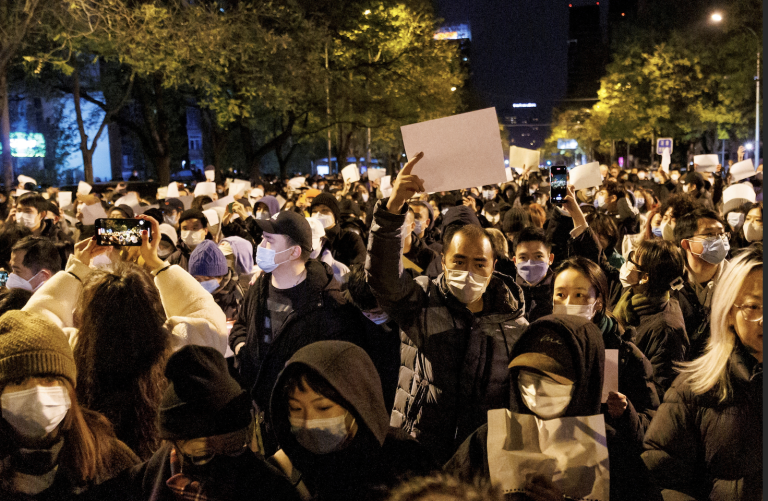Late this November, when tens of thousands of Chinese rose up to oppose the communist regime’s ruinous “zero-COVID” epidemic control measures, getting information about the scale and nature of the protests across to the outside world was difficult.
But that didn’t stop people from trying to circumvent the Chinese Communist Party’s (CCP) vast censorship infrastructure, and a few individuals became important nodes for updates about the situation unfolding across Chinese cities and provinces.
Residing in northern Italy, a 30-year-old painter and former teacher from eastern China’s Anhui Province, was one of them, receiving thousands of messages a day from his homeland.
- ‘We Don’t Want the Communist Party’: Chinese Rise Up Against ‘Zero-COVID’ Lockdowns
- China Removes UK Consul Officials Over Protest Incident: UK FM Cleverly
Posting on Twitter under the name “Teacher Li is not your teacher” (李老师不是你老师), he said during the height of the protests he was posting every few minutes, and sometimes only had two hours sleep per night.
Speaking with Reuters, he requested he be identified only by his surname Li, citing privacy concerns.

Success
You are now signed up for our newsletter
Success
Check your email to complete sign up
Chinese in the mainland fearing repercussions for posting information about the protests would send their reports to Mr. Li privately, and he would then use the safety of his foreign location to repost their submissions.
The protests began in immediate reaction to a tragic fire in Urumqi, northwest China’s Xinjiang region, which saw dozens immolated while locked inside their homes and as firefighters struggled to reach them after weeks of lockdown. Protests occurred both in China and among overseas Chinese — mostly students — around the world.
While the Xi Jinping leadership has been planning a relaxation in “zero-COVID” measures since at least the 20th party Congress, the demonstrations were widely seen as a tipping point to an easing the draconian restrictions.
- China Continues to Ease Out of ‘Zero-COVID’ Following Mass Protests
- Reading the Results of China’s 20th Party Congress
The protests were more intense from Nov. 24 to Nov. 28, then largely petered out in the final days after police mounted a heavy presence on streets and scooped up some protesters. The vast majority of the protests opposed zero-COVID measures, with a number calling for the ouster of Xi or the Communist Party itself.
Nov. 30 also saw the death of former Party boss Jiang Zemin, whom dissidents have blamed for intensifying the CCP’s corruption and authoritarian rule.
Chinese authorities have largely stayed silent about the protests. Earlier this month, in a statement that did not refer to the protests, the Communist Party’s top body in charge of law enforcement agencies said China would crack down on “the infiltration and sabotage activities of hostile forces” and would not tolerate any “illegal and criminal acts that disrupt social order”.
“Things happened far beyond what we have seen, it’s just that much has gone unreported,” Li said of the mass discontent among ordinary Chinese towards the CCP’s pandemic curbs that resulted in historic protests.
Despite the protests mostly dying out in China, the event appears to have spread interest in alternative sources of information among Chinese, especially the youth. Li’s Twitter followers have grown from 140,000 in mid-November to over 860,000 now.
While the CCP expends much treasure and manpower to control the internet and block access to foreign news sites and social media, Beijing’s controls are often circumvented by people using VPNs. However, those who go this route risk being tracked down and punished by the authorities.
A pinned tweet and reply on Li’s profile gives some points of advice for those in China sending him information:
1. Don’t use a Twitter handle that’s the same as the name you use for Chinese social media, including your name and profile pic.
Overseas Chinese Twitter user “Teacher Li is not your teacher”
2. Don’t post the same content on both Twitter and Chinese social media.
3. Keep the details of your personal life and political activity separate if you don’t want to lose your Twitter account.
4. I delete whatever information I receive daily. I suggest you do the same after sending it to me.
5. Try your best to avoid using Chinese phone numbers or email addresses to register on foreign social media sites.
6. For increased security, use separate passwords and password logic for your Chinese and foreign social media accounts.
7. Use an iPhone bought overseas or an Android phone with better security features exclusively for your political activity/foreign internet browsing.
8. If the police merely summon you by phone [rather than arriving at your home], only go to them after wiping your phone clean.
Even though he lives outside China, Li says he may yet face consequences for his actions. His family back home have been interrogated by police, and he himself has received death threats.
“Right now, I am a person without a future,” he told Reuters.
Despite this, he says he is determined to keep going because his account has become a symbol of “freedom of speech”, even though the price of his actions means he can’t return to the country of his birth.
Reuters contributed to this report.















